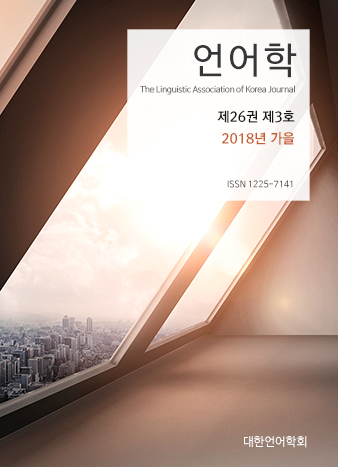대한언어학회 전자저널

26권 3호 (2018년 9월)
- Degree Modifier Associations in the Michigan Corpus of Academic Spoken English
-
Jungyull Lee
Pages : 25-49
Abstract
Lee, Jungyull. (2018). Degree modifier associations in the Michigan Corpus of Academic Spoken English. The Linguistic Association of Korea Journal, 26(3), 25-49. From a semantic-analytic perspective, this paper investigates how degree modifiers associate with lexemes in the Michigan Corpus of Academic Spoken English. The corpus is utilized to explore diverse associations between degree modifiers and lexical items having positive, negative, and neutral connotations. The analysis of various lexemes in connection with degree modifiers identifies the relationship that accounts for the preferences governing the associations between degree modifiers and the lexemes; i.e., the strongest relationship seems to occur with respect to the frequencies of their associations. In this study, it is significant to note that variable lexemes other than ostensible lexemes are included in terms of lexical variabilities. In light of the corpus-based data on the nature of degree modifier associations proposed in this study, each degree modifier is shown to associate powerfully with distinct lexemes implying exceptional semantic preferences. The analysis of semantic preferences pertaining to degree modifiers suggests that each degree modifier preferentially selects distinctive types of lexemes; namely indications of degree modifiers may be noticeable in discourse.
Keywords
# corpus # degree modifier # association (collocation) # lexeme # lexical variability # semantic preference
References
- Allerton, D. J. (1987). English intensifiers and their idiosyncrasies. In R. Steele & T. Threadgold (Eds.), Language topics: Essays in honour of Michael Halliday, 2 (pp. 15-31). Amsterdam: John Benjamins.
- Altenberg, B. (1991). Amplifier collocations in spoken English. In S. Johansson & A. B. Stenström (Eds.), English computer corpora: Selected papers and research guide (pp. 127-147). Berlin: Mouton de Gruyter.
- Biber, D. (1988). Variation across speech and writing. Cambridge: Cambridge University Press.
- Cambridge International Dictionary of English. (1995). Cambridge: Cambridge University Press.
- Firth, J. R. (1957). Paper in linguistics. London: Oxford University Press.
- Greenbaum, S. (1970). Verb-intensifier collocations in English: An experimental approach. Janua Linguarum, Series Minor 86. The Hague: Mouton.
- Holmes, J. (1984). Hedging your bets and sitting on the fence: Some evidence for hedges as support structures. Te Reo, 27, 47-62.
- Kennedy, G. (2003). Amplifier collocations in the British national corpus: Implications for English language teaching. TESOL Quarterly, 37(3), 467-487.
- Lee, J.-Y. (2011). Completely and absolutely in English: A data-based analysis. Unpublished master’s thesis, Hankuk University of Foreign Studies.
- Lee, J.-Y. (2014). A data-based analysis of absolutely and utterly in their collocation patterns and stand-alone use. The Sociolinguistic Journal of Korea, 22(2), 91-109.
- Leech, G. N. (1974). Semantics. Harmondsworth: Penguinbooks.
- Lorenz, G. (1999). Adjective intensification-learners versus native speakers: A corpus study of argumentative writing. Amsterdam: Rodopi.
- Palmer, H. E. (1933). Second interim report on English collocations. Tokyo: Kaitakusha.
- Paradis, C. (1997). Degree modifiers of adjectives in spoken British English. Lund, Sweden: Lund University Press.
- Quirk, R., Greenbaum, S., Leech, G., & Svartvik, J. (1985). A comprehensive grammar of the English language. London: Longman.
- Simpson, R. C., Briggs, S. L., Ovens, J., & Swales, J. M. (2002). The Michigan corpus of academic spoken English. Ann Arbor, MI: The Regents of the University of Michigan.
- Sinclair, J. (1987). Collins COBUILD English language dictionary, London: Harper Collins.
- Sinclair, J. (1991). Corpus, concordance, collocations. Oxford: Oxford University press.
- Sinclair, J., Jones, S., & Daley, R. (2004). English collocation studies: The OSTI report. Birmingham: Continuum Press.
- Tao, H. (2007). A corpus-based investigation of absolutely and related phenomena in spoken American English. Journal of English Linguistics, 35, 15-29.